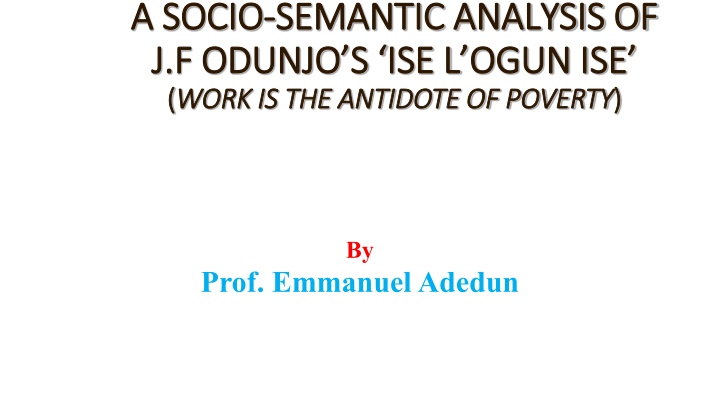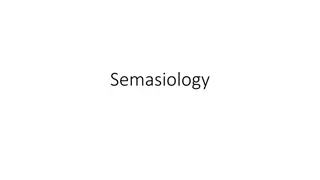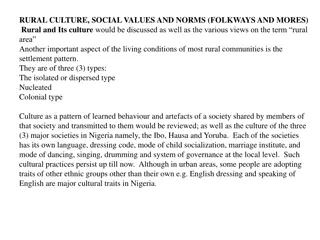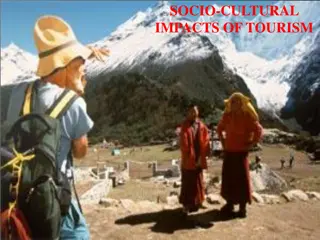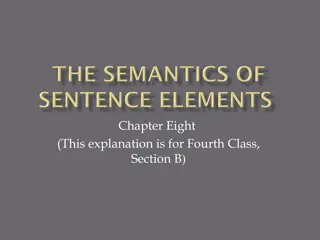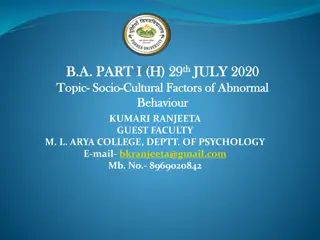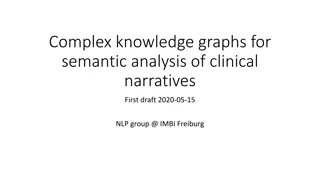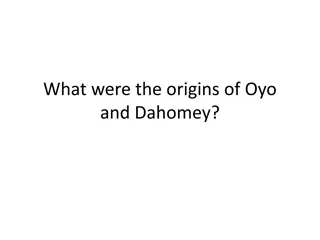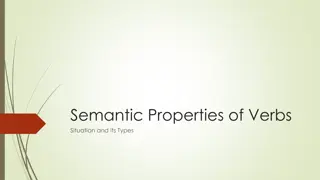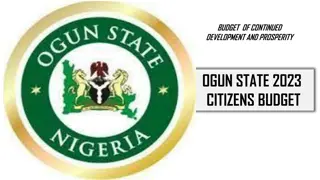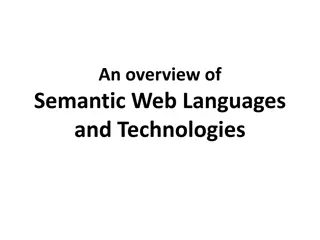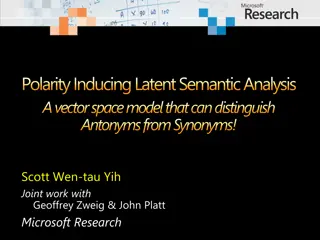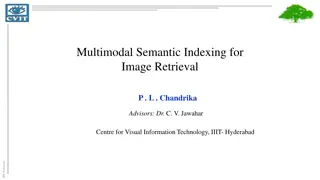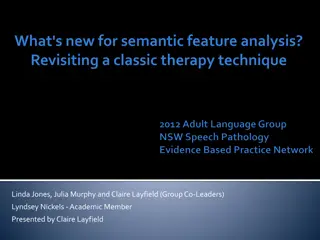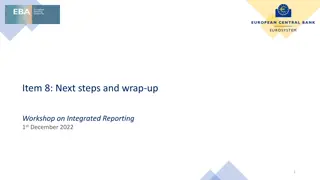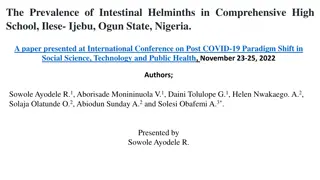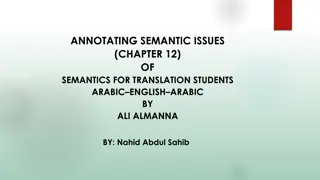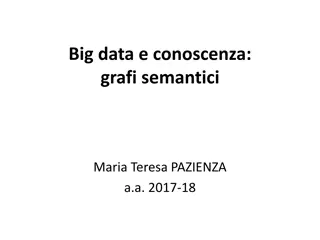Socio-Semantic Analysis of J.F. Odunjo's "Ise L'ogun Ise" and Yoruba Cultural Values
Societal values, cultural identity, and the impact of linguistic forms on social meaning are explored in this study. Through an analysis of J.F. Odunjo's poem "Ise L'ogun Ise" and Yoruba socio-cultural values, the study aims to address the decline in moral standards and societal ethos, advocating for a revival of traditional values in modern society.
Download Presentation

Please find below an Image/Link to download the presentation.
The content on the website is provided AS IS for your information and personal use only. It may not be sold, licensed, or shared on other websites without obtaining consent from the author.If you encounter any issues during the download, it is possible that the publisher has removed the file from their server.
You are allowed to download the files provided on this website for personal or commercial use, subject to the condition that they are used lawfully. All files are the property of their respective owners.
The content on the website is provided AS IS for your information and personal use only. It may not be sold, licensed, or shared on other websites without obtaining consent from the author.
E N D
Presentation Transcript
A SOCIO A SOCIO- -SEMANTIC ANALYSIS OF SEMANTIC ANALYSIS OF J.F ODUNJO J.F ODUNJO S S ISE L ISE L OGUN ISE ( (WORK IS THE ANTIDOTE OF POVERTY WORK IS THE ANTIDOTE OF POVERTY) ) OGUN ISE By Prof. Emmanuel Adedun
INTRODUCTION INTRODUCTION Socio-Semantics refers to society and meaning social meaning. The term social meaning identifies the constellation or agglutination or congregation of traits or features or characteristics that linguistic forms convey about the social identity of their users for example, their demographics, personality and ideological orientation. Ideological orientation and value system can be positive or negative Nigerian value system, Yoruba value system, etc.
YORUBA SOCIO YORUBA SOCIO- -CULTURAL VALUE SYSTEM CULTURAL VALUE SYSTEM Value system refers to the principles, ideologies, or standards by which one and one s society/community lives, relates to others, makes decisions, or determines modes of existence. In the light of moral rectitude, superficial success and get-rich syndrome prevalent in our modern society, a voyage into the native culture through a linguistic analysis of classical creative products such as poetry, film and music will not only give us an understanding of the prevailing societal problem but will also point us to the solution.
SOME YORUBA SOCIO SOME YORUBA SOCIO- -CULTURAL VALUES CULTURAL VALUES 1. Omoluabi (Integrity and Character) 2. Laakaye (Knowledge-imo, Understanding-oye and Wisdom-ogbon) 3. Aniselapa (Visible means of livelihood) 4. Akinkanju (Valour) 5. Imurasise (Hardwork) 1-5 are expected to result in: 5. r (Wealth) 6. Iy (Honour)
PROBLEM OF THE STUDY PROBLEM OF THE STUDY Daily happenings around us and media reports all over the place are full of stories of downward trend in societal ethos and slides in cultural values. We are now daily cohabiting with issues of examination misconduct, students unrest, cultism, sex abuse, drug abuse, get-rich syndromes (yahoo-yahoo), among others (Shitu, 2018). Inculcating socio-cultural values and traditional moral standards, incorporating them to formal pedagogy and juxtaposing them with the modern Christian religion can bring about a much needed societal regeneration.
AIM OF THE STUDY AIM OF THE STUDY The major aim of this study is to use the Ideational Metafunction of the Systemic Functional Linguistics to analyse J.F. Odunjo s classical poem Ise L ogun Ise (Work is the Antidote for Poverty) in order to extricate the lexico-grammatical choices in the transitivity system of the structure of the clauses as a way of demonstrating a practical solution to societal problems. This reveals the grammar of the clause as representation (transitivity patterns) which represents the encoding of experiential meanings i.e. meaning about the world, about experience, about how we perceive and experience what is going on - how we can describe what is being talked about and understand the world around us.
RESEARCH OBJECTIVES RESEARCH OBJECTIVES There are 3 Research Objectives as follows: 1. To use the instrumentality of Ideational Metafunction to analyse J.F. Odunjo s Ise L ogun Ise (Work Is the Antidote for Poverty). 2. To interpret J.F. Odunjo s Ise L ogun Ise in its socio-cultural context. 3. To discuss the social meaning of Ise L ogun Ise in the context of the prevailing socio-cultural norms in Nigeria.
SIGNIFICANCE OF THE STUDY SIGNIFICANCE OF THE STUDY 1. Provides an intellectual discourse towards solving the socio-cultural problems of Nigeria through the activation of existing dormant traditional values. 2. Engineers an authentic Nigerian cum African rejuvenation of acceptable conducts and behaviours through the process of digging deep into the abandoned traditional values as can be exemplified by films, music, poems and rhymes e.g. (Rain, Rain vs Ojo nro). 3. Calls attention to the complementarity between traditional value system and biblical morality e.g. hard work is traditionally recognized a great virtue while the Bible also teaches and admonishes people to work hard: Proverbs 22:29 - seest thou a man diligent in his business?
JOSEPH FOLAHAN (J.F.) ODUNJO JOSEPH FOLAHAN (J.F.) ODUNJO Joseph Folahan Odunjo (1904 1980) was a Nigerian writer, educator and politician best known for his works in Yoruba children's literature. Schoolmaster of the Catholic Training College, Ibadan, from 1924 to 1927 Was a teacher and headmaster of various Catholic Schools from the 1940s to the 1950s His printed work in 1958 was one of the early written works of the language. He wrote several novels, plays, poems and texts in Yoruba Language One of his poems is the Yoruba classic: Ise L ogun Ise (Work is the Antidote for Poverty)
TRANSLATION METHODS TRANSLATION METHODS Types of Translation 1. Borrowing 2. Calque 3. Literal 4. Transposition 5. Modulation 6. Equivalence or Reformation 7. Adaptation or Creative
CREATIVE TRANSLATION CREATIVE TRANSLATION Takes into account the context of the source content, making sure that the translation doesn t just make sense from a grammatical and linguistic point of view, but also from the cultural perspective of the target language. It takes into account the cultural and social significance of the content along with the values of the new audience, and builds them together in order to effectively communicate the content s message. E.g. 22. Ekun nbe fomo ti nsa kiri [There is sorrow for the vagabond child] vs Tears are available for a child that is running around.
IDEATIONAL IDEATIONAL METAFUNCTION METAFUNCTION 1. Halliday - Writers-readers and negotiation of social relations 2. SFT - provides the approach through which linguistic features of a discourse/text are analyzed and how those features relate to social cultural context and the overall intention of the text. 3. Linguistic resources - associated with the creation of different layers of meaning which function at the level of grammar and discourse semantics.
IDEATIONAL METAFUNCTION CONTD IDEATIONAL METAFUNCTION CONTD Experiential function is realized by the transitivity system Three types of transitive system - participant, process and circumstance. Process is verb, participant is subject and circumstance is adverb. Process equals verb; it shows idea from the phenomenon. For example the use of transitivity by clauses: - I call my brother there ; You left your key . The two processes have meaning (call, and left). Like the first verb "call", it shows that the subject is doing a calling, the participant is I , process is call , circumstance is there .
IDEATIONAL METAFUNCTION CONTD IDEATIONAL METAFUNCTION CONTD Thompson s (2004) articulates Halliday s concept of Ideational Metafunction and isolates 6 Processes in the English Transitivity System as follows: Material Process- the physical action of doing and happening. Mental Process- construing the speaker s inner mind of imagination and consciousness.
IDEATIONAL METAFUNCTION CONTD IDEATIONAL METAFUNCTION CONTD Relational Process- being and having. Behavioral Process - human psychological content Verbal - verbal communicative constructs and reported speeches Existential Process- expresses existence of an entity, there is.
METHOD OF ANALYSIS METHOD OF ANALYSIS 1. The Data J.F. Odunjo s Ise L ogun Ise ( Work is the Antidote for Poverty ) 2. Source of Data Originally published in Yoruba Readers 3. Method of Analysis application of ideational features in order to arrive at the intended meaning of the text. The first is clause-by-clause structural segmentation, signifying grammatical structures and the domains of focus of the poem. The second relates the text in a systemic shape in order to reveal the transitivity components of the textual system.
PRESENTATION OF DATA PRESENTATION OF DATA THE POEM ISE ISE [WORK IS THE ANTIDOTE OF POVERTY] [WORK IS THE ANTIDOTE OF POVERTY] THE POEM ISE L ISE L OGUN OGUN 1. Ise l ogun ise [Work is the antidote for poverty] 2. Mura si ise, ore mi [Work hard, my friend] 3. Ise la fi nd eni giga [Hardwork results in greatness] 4. Bi a ko ba reni fehin ti [If there is no one to lean on] 5. Bi ole la ri [It seems as if one is lazy] 6. Bi a ko ba reni gbekele [If there is no one to trust] 7. A te ra mo ise eni [One concentrates on one s work] 8. Iya re le lowo lowo [Your mother might be rich]
PRESENTATION OF DATA CONTD PRESENTATION OF DATA CONTD 9. Baba re si le lesin le kan [Your father might have a horse in the horse s stand] 10. Ti o ba gboju le won [If you depend on them] 11. O te tan ni mo so fun o [Your embarrassment is certain, I tell you] 12. Apa lara [One s arm is one s sure kinsman] 13. Igunpa niyekan [one s shoulder is one s sure sibling] 14. B'aye ba fe o loni [If the world loves you today]
PRESENTATION OF DATA CONTD PRESENTATION OF DATA CONTD 15. Ti o ba lowo lowo [If you are rich] 16. Won a tun fe o lola [they will as well love you tomorrow] 17. Abi ko wa nipo atata [Moreso, if you occupy an esteemed position] 18. Aye a ye o si terin terin [The world will honour you with laughter] 19. Je ki o deni ti n rago [Until you are faced with the riches-to-rags misfortune] 20. Ko ri bi won se nyinmu si o [You will then notice how you are mocked]
PRESENTATION OF DATA CONTD PRESENTATION OF DATA CONTD 21. Iya nbo fomo ti ko gbon [There is suffering for the foolish child] 22. Ekun nbe fomo ti nsa kiri [There is sorrow for the vagabond child] 23. Mafowuro sere, ore mi [Don't waste your morning, my friend] 24. Mura si se [[Work hard] 25. Ojo nlo [Time hastes away]
ANALYSIS ANALYSIS 1. Ise l ogun ise [Work is the antidote for poverty] Part1 + Proc+Part2 (NomGrp) 2. Mura si ise, ore mi [Work hard, my friend] Proc (VerbGrp)+Part2 (NomGrp) 3. Ise la fi nd eni giga [Hardwork results in greatness] Part+Proc+Circ(PrepGrp)
ANALYSIS CONTD ANALYSIS CONTD 4. Bi a ko ba reni fehin ti [If there is no one to lean on] 5. Bi ole la ri [It seems as if one is lazy] 6. Bi a ko ba reni gbekele [If there is no one to trust] 7. A te ra mo ise eni [One concentrates on one s work] 8. Iya re le lowo lowo [Your mother might be rich]
ANALYSIS CONTD ANALYSIS CONTD 9. Baba re si le lesin le kan [Your father might have a horse in the horse s stand] 10. Ti o ba gboju le won [If you depend on them] 11. O te tan ni mo so fun o [Your embarrassment is certain, I tell you] 12. Apa lara [One s arm is one s sure kinsman]
ANALYSIS CONTD ANALYSIS CONTD 13. Igunpa niyekan [one s shoulder is one s sure sibling] 14. B'aye ba fe o loni [If the world loves you today] 15. Ti o ba lowo lowo [If you are rich] 16. Won a tun fe o lola [they will as well love you tomorrow] 17. Abi ko wa nipo atata [Moreso, if you occupy an esteemed position]
ANALYSIS CONTD ANALYSIS CONTD 18. Aye a ye o si terin terin [The world will honour you with laughter] 19. Je ki o deni ti n rago [Until you are faced with the riches-to-rags misfortune] 20. Ko ri bi won se nyinmu si o [You will then notice how you are mocked] 21. Iya nbo fomo ti ko gbon [There is suffering for the foolish child]
ANALYSIS CONTD ANALYSIS CONTD 22. Ekun nbe fomo ti nsa kiri [There is sorrow for the vagabond child] 23. Mafowuro sere, ore mi [Don't waste your morning, my friend] 24. Mura si se [[Work hard] 25. Ojo nlo [Time hastes away]
DISCUSSION DISCUSSION 1. 1-4: Importance of Work ( alowo ma sise , ole). 2. 4-7: Self-reliance (the principle of DIY). 3. 8-11: Futility of relying on others success; not even father or mother (to avoid disappointment, rely on God-given strength (Work &Pray Principle) 4. 12-13: Organs of the body responsible for work are used as anecdotes/ personification of what to depend on (apa=ara; igunpa=iyekan)
DISCUSSION CONTD DISCUSSION CONTD 5. 14-20: Success attracts friends but failure is an orphan - Prov.19:4 - Wealth maketh many friends; but the poor is separated from his neighbor. 6. 21-25: Importance of having a vision/plan of life built on hardwork and education early in life in order to escape poverty and be successful. 7. 1-25: Hard-work is equal to comfortable life. Success. Self- actualization. Self-reliance. Self-defence.
CONCLUSIONS CONCLUSIONS 1. Hard work is a virtue that must be inculcated early in life. 2. There are other virtues in our socio-cultural milieu that we can tap into for the purpose of societal rejuvenation; these resonate with Biblical injunctions. 3. With the inculcation of socio-cultural value of hard work and other available societal values, vices (especially among the youths) will drastically reduce.
RECOMMENDATIONS RECOMMENDATIONS 1. Stakeholders in the education industry should work out a synergy between positive/acceptable moral standards domiciled in our cultures and the Bible. 2. There should be a conscious adoption of/return to the pedagogical practices and reading of classical/modern books/poems that espouse acceptable moral conducts.
RECOMMENDATIONS CONTD. RECOMMENDATIONS CONTD. 3. Knowledge producers should beam their intellectual searchlights on archival artifacts where solution to modern problems reside - Ecc.3:15 - That which hath been is now; and that which is to be hath already been; and God requireth that which is past. Prov. 25:2 - It is the glory of God to conceal a thing: but the honour of kings is to search out a matter. Ecc. 1:9 - The thing that hath been, it is that which shall be; and that which is done is that which shall be done: and there is no new thing under the sun. - The Secret of Research
REFERENCES REFERENCES Toyin Falola (1999). Yoruba Gurus: Indigenous Production of Knowledge in Africa. Africa World Press, 1999. pp. 17 18. ISBN 978-0-86543-699-2. ^ "Remembering J. F. Odunjo, the literary icon". WN. Nigerian Guardian. Retrieved June 14, 2016. ^ Albert S. G rard (1972). Black Africa, Volumes 2-3. the University of Virginia: St. John's University Press. p. 195. ISSN 0034-6640. Retrieved June 14, 2016. ^ Ay Bamgbose; l t nd O. l t nj (1986). Yoruba: A Language in Transition. University of Virginia: J.F. dunj Memorial Lectures. Retrieved June 14, 2016. ^ Daily Times of Nigeria Limited (1971). Who's who in Nigeria: a biographical dictionary. Times Press (Magazine Division). Retrieved June 14, 2016. ^ "Odunjo remembered". Allafrica. Retrieved June 14, 2016.
REFERENCES CONTD REFERENCES CONTD ^ Janheinz Jahn; Ulla Schild; Almut Nordmann Seilerr (1972). Who's who in African Literature: Biographies, Works, Commentaries. Horst Erdmann Verlag. p. 286. ISBN 978-3-7711-0153-4. Retrieved June 14, 2016. ^ Albert S. G rard (1972). Review of national literatures. Black Africa, Volumes 2 3. St. John's University Press. Retrieved June 14, 2016. ^ Kayode Sobayo (2007). "Abeokuta: 175 years of unity & excellence : plus who's who". Skys Production. p. 66. ISBN 978-978-2829-07-8. Retrieved June 14, 2016. ^ Ak nw m l (1992). "New Findings in Yoruba Studies (J.F. dunj memorial lectures series)". University of Virginia. ISBN 978-978-30181-4-3. Retrieved June 14,2016. ^ Philiip Ad d tun g nd j . 2016. Od njo, Joseph Fol h n. Encyclopedia of the Yoruba, ed. by T y n F lol and Ak nt nde Ak nyem , pp. 251,252. Bloomington, IN: Indiana University Press.
REFERENCES CONTD. REFERENCES CONTD. ^ Who's who in Nigeria. the University of California: Nigerian Printing and Publishing Company. 1956. p. 212. Retrieved June 14, 2016. ^ Ay Bamgbose; l t nd O. l t nj (1986). Yoruba: A Language in Transition. 1. J.F. dunj Memorial Lectures (University of Virginia). p. 5. Retrieved June 14, 2016. ^ "Literatures in African languages : Yoruba". Encyclop dia Britannica for Kids. Retrieved June 14, 2016. Andrea Beltrama (2020), Social meaning in semantics and pragmaticsFirst published: 20 August 2020 https://doi.org/10.1111/lnc3.12398 Advances in Social Sciences Research Journal Vol.5, No.2 Publication Date: Feb. 25, 2018 DoI:10.14738/assrj.52.3179. Adebisi, K. S. (2018). Moral Decadence Among Nigerian Youths As Future Leaders: A Socio-Cultural Regeneration. Advances in Social Sciences Research Journal, 5(2) 190-199 Ifrayanto&Maulia (2014:78) Zahoor & Janjua (2016: 202)
The End THANK YOU
